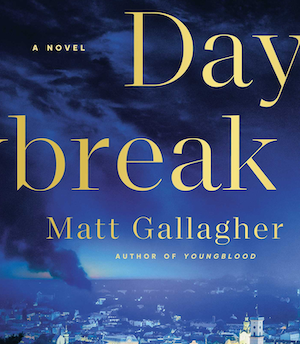The notion of “the good war”—a just, nationwide effort against an obvious and perilous aggressor—pulses through Matt Gallagher’s latest novel, Daybreak (Simon & Schuster, Feb 20, 2024). This notion has perhaps been freshly reinstated in American public discourse, though Gallagher reminds us that it never ceased to throb in the veteran community—that tiny sliver of our population who fought the Global War on Terrorism (GWOT) most of us ignored.
For the last two decades, the United States has been in the business of war without talking about it much. It took Ukraine and Gaza to flood our public discourse with the language of warfare. An outpouring of language every bit as impassioned and rich in moral meaning as the words we use to describe our experience of love: devotion, betrayal, cruelty. Now our daily vocabulary includes words like aggression, appeasement, atrocity. The moral judgment in this language developed over centuries of argument. It is the vocabulary of a debate that—as a self-styled connoisseur of violence—I find refreshing. Scrutiny of state-sanctioned violence remains central to citizenship and demands a common vocabulary for coherent discussion. I’m not proposing an ethical checklist, but a shared understanding of basic concepts, such as the notion that “aggressive acts justify violent resistance.” As George Orwell put it in his 1943 essay, “Looking Back on the Spanish Civil War”: To survive you often have to fight, and to fight you have to dirty yourself. War is evil, and it is often the lesser evil.
There’s no such thing as a good war, but the defense of Ukraine provides one of the modern era’s most straightforward cases of a necessary one.
Full disclosure: like Gallagher, whose novel is inspired by his reporting and field work in wartime Ukraine, I’ve got skin in the game. My wife is Ukrainian, and I have spent significant chunks of my life in Kyiv. First as a Marine guard at the US Embassy, then as a student at the Kyiv Linguistic Institute (where I studied Russian, not Ukrainian), and finally shuttling back and forth from my first United Nations field assignment in the sleepy town of Vladikavkaz at the maw of the Russian North Caucasus. For me, Ukraine is family, friends, and some of the best memories of my life. I write about the country’s defense with both passion and prejudice and do not pretend otherwise.
My fifteen-year tenure as an international civil servant colored my perception of the GWOT far more than my stint in the Marine Corps. I enlisted before 9-11 and—with dreams of becoming a spy—left the military nine months after the attack to study international relations on a National Security Education Program fellowship. I ended up in the UN, where I spent a decade as a field security officer, mostly in East Africa. From Mogadishu, I watched the messy business of a war fought by all volunteers, funded by deficit spending, and not easily delimited by dates, borders, or a well-defined cause. Once, after visiting a town in Lower Shabelle that featured the still gaping hole from an American drone strike, one of my Somali staff asked, “How many brown people does Obama have to kill before your congress knows he means business?”
Gallagher’s novel follows disillusioned GWOT veteran Luke “Pax” Paxton to Ukraine where he volunteers to fight the Russians and reconnects with a woman from his past. Brooding, fumbling, with thoughts of Svitlana never far from his mind, Pax travels to Lviv at the behest of Han Lee, his platoon sergeant more than a decade earlier.
We first meet the two former paratroopers as they rumble on a nighttime bus to Lviv with the first wave of westerners to answer President Zelensky’s call for international volunteers. The two men are troubled in different ways, neither able to fully shake their earlier experiences. Of the US’s disastrous withdrawal from Afghanistan, Pax quips, “Dumb wars get dumb endings.” Then he shrugs.
When they get to Lviv, they meet Bogdan, a battle-scarred recruiter for the international legionnaires in Lviv who explains the Russian justification for the war:
In old Slavic, Ukraine translates to “the borderlands.” I tell all my foreigners this because it is important to know the orc mindset. They do not believe we deserve existence, except to provide for them. We are the wheat people who live in the fields beyond . . .
But aside from a vague notion of usefulness, Pax cannot articulate his own motivation to fight another war in a different country. From the bus ride, up until the moment the two meet Bogdan, Pax is unable to give a clean answer to the question, “Why are you here?”
Lee doesn’t have that problem. He’s there to kill Russians. In Ukraine, Lee—a second-generation Korean-American from Alabama, known as the “Yellow Reb” in their old unit—has found something worth fighting for. “You know how fucking rare that is?” Lee asks the recruiter. “You can take my passport for all I care, Bogdan. I’m here for the long haul. Gimme a rifle squad, point me to the zero line, and we’ll rack up skulls for the wheat people.”
It is Pax who fails Bogdan’s initial sniff test. “I wish you luck finding a way to help,” Bogdan tells Pax. “My country needs much of it.”
In the long literary tradition of westerners intervening in the good war, Pax is more Lord Jim than Robert Jordan. No one expects Pax to blow up any bridges. He has no grand liberal-social-political philosophy. Like Jim though, Pax has plenty of sullen ghosts, and his rejection by the international volunteers adds another to the host already swirling in his head. But the event that haunts Pax most—his version of the SS Patna—is a decade-old suicide attack during his deployment to Afghanistan’s restive Wardak province. More than finding a purpose or even rejoining Svitlana, Pax, a working class schlub of a hero I rooted for from page one, seeks absolution. In many ways, Pax is exactly the type of GWOT veteran drawn to Ukraine’s defense. In a piece for Esquire, Gallagher described the international volunteers:
Everyone’s story is different. Everyone’s story is a little the same. Certain traits and patterns recur as we meet more volunteers. Most are men, though not all. Many of the younger ones served during the tail end of the war on terror and didn’t get the combat experience they’d anticipated or perhaps wanted. Some of the older ones sold their businesses or homes to sustain their work. More than a few are living off military pensions or disability checks. I stop tallying the number of divorces and separations. One can view this as a bit sad, even pathetic. Or one can regard their coming to Ukraine as an act of courage. Here they are, in another war zone, trying to pay it forward to others, because they believe they still have more to give.
Gallagher paints a vivid picture of a Lviv inundated with such men, the type of warzone city where, as if by some secret pact, all the “contractors,” journalists, aid workers, and spies converge in one bar or hotel: Gaylord’s in Madrid, the Continental Palace in Ho Chi Minh City, Le Commodore Hotel in Beirut, Sarajevo’s Holiday Inn, the Mos Eisley Cantina on Tatooine. In the Lviv equivalent of such an establishment—packed with men dressed in tactical-chic, sipping borscht and beers—Lee and Pax run into their former platoon commander, Captain Jordan Todd “J.T.” Merriman. A decade earlier, Merriman had ordered Pax to stand down at that checkpoint in Wardak—to not take the shot that could have stopped the suicide bomber and saved American lives. For the petulantly class-conscious former corporal, Merriman is worse than a West Pointer: he is a Stanford grad. The military is designed to make one a little scared of the person above you in the hierarchy and a little contemptuous of the one below. Gallagher plucks the tension of that power dynamic like a maestro, a tension that crescendos into a scene that rattles Pax’s already shaky sense of sense worth as he at last confronts Merriman. His former commander’s response is impressive:
Twelve Afghans were killed at that checkpoint, too, Paxton. It’s interesting you never seem to bring them up. You ever give one thought to them. I have. If you need some burden lifted, yes, it’s true, I ordered you not to shoot because I was thinking of those civilians around us. I decided in that moment we were the soldiers, we’d volunteered to incur risk. They hadn’t. It was the wrong call, and it torments me every minute, every day. But don’t you dare fucking presume I don’t think about them, that I don’t remember them. They’re why I’m here now. Now get the fuck out of my sight. I have work to do.
To say that Gallagher depicts the veteran community well is like saying Mozart wrote some good music. More than that, though, Gallagher makes me proud to be a member; a feeling I don’t have as often as I’d like. About 18 percent of the more than one thousand people charged in connection with the January 6, 2021, attempted insurrection served in the military. As veterans we should not only claim our best—many of whom can be found among the international legionnaires—but also acknowledge our worst.
*
Pax’s relationship with Svitlana plays out in flashbacks of his stint based in Vicenza, Italy. Young and free with a little bit of money and a singular interest in discovering themselves, they fell in love over weekends and holiday-leaves to Florence, Cinque Terre, and Sardinia. In one gorgeously described stay on the island of Capri in the Bay of Naples, they drank white wine, dined on oysters, and burned through two of his credit cards. A month after they returned from Capri, Svitlana returned home to Lviv while Pax deployed on the last of the 173rd Airborne Division’s tours to Afghanistan. The mission, in Wardak Province, in the country’s central region, had been to “enable the transfer of security of the province to the Afghan National Security Forces.”
When they parted, he and Svitlana had agreed not to take things too seriously. They’d keep in touch. But then came Pax’s mid-tour leave from Wardak. Suddenly he needed Svitlana in a way he never had before. He begged her to meet him in Milan. Really begged. In Milan, Svitlana saw Pax at his worst. Bug-eyed and internment-camp lean, he drunkenly called her a whore after trying to hack her Facebook account. They don’t see each other again until, a decade later in Lviv, Svitlana has a ten-year-old son, an estranged but very much alive husband, a house with a flowerbed, and the same question for Pax as everyone else, “Why are you here?”
She has more reason than anyone to be skeptical of the answer. Svitlana had grown up resenting Lviv for no other reason than that it was her home. She’d left as soon as she could, returning only when she had nowhere else to go. To establish psychic intimacy with a character with a cultural identity different from your own is to take on a tremendous responsibility. As we cascade to Gallagher’s shotgun blast of an ending, Svitlana’s inner turmoil, vulnerabilities, and regrets drive the plot as much as Pax’s. The sticky mess of their love feels true.
Westerners narrate foreign conflict from a position of immense privilege. But Gallagher has not written a tourist narrative. He knows wartime Ukraine. He worked and traveled all over the country—Kyiv, Odessa, Mykolaiv, Kharkiv, Bakhmut, Kherson, Dnipro. His writing layers the monstrousness of the war onto a nuanced view of Ukrainian society. Compassion is an unstable emotion; representing a society at war also demands a keen, unflinching detachment. In the novel, Pax meets a far-right nationalist and the country’s highly effective and highly controversial Azov Battalion is discussed frankly.
Hemingway and Conrad are on every page of this beautiful, haunted wartime romance, but in passion and prose, it is George Orwell that Matt Gallagher parallels most. Everyone knew that the Spanish Civil War was one of the decisive events of twentieth century—a battle against fascism far larger than its combatants—everyone said so at the time and everyone was right. But it was Orwell who—again in “Looking Back on the Spanish Civil War”—pointed directly at his countrymen:
We in England underrate the danger of this kind of thing, because our traditions and our past security have given us a sentimental belief that it all comes right in the end and the thing you most fear never really happens. Nourished for hundreds of years on a literature in which Right invariably triumphs in the last chapter, we believe half-instinctively that evil always defeats itself in the long run. Pacifism, for instance, is founded largely on this belief. Don’t resist evil, and it will somehow destroy itself. But why should it? What evidence is there that it does?
To write about war in plain, vigorous language one must think fearlessly, and if one thinks fearlessly, one cannot be politically orthodox. Matt Gallagher is an unusual kind of person as well, with a temperament all too rare these days. We should be proud that the United States still produces writers like him. Daybreak represents some of his finest work.
Dewaine Farria
Dewaine Farria is the author of the novel Revolutions of All Colors (Syracuse University Press, November 2020). Tobias Wolff selected the novel as the winner of Syracuse University’s 2019 Veteran’s Writing contest. Dewaine’s short stories and essays have appeared in Literary Hub, the New York Times, Rumpus, the Southern Humanities Review, CRAFT, and the Daily Beast. He is a frequent contributor to War on the Rocks. His work has also appeared in the anthologies, Our Best War Stories: Prize-winning Poetry and Prose from the Col. Darron L. Wright Memorial Award (Middle West Press, October 2020) and Tolstoy Together: 85 Days of War and Peace with Yiyun Li (A Public Space Books, September 2021). He has served as a contributing editor for the Maine Review and an instructor in the Voices From War Writing Workshop. As a U.S. Marine, Dewaine served in Jordan and Ukraine. Besides his stint in the military, Dewaine spent most of his professional life working for the United Nations Department of Safety and Security (UNDSS), with assignments in the North Caucasus, Kenya, Somalia, and Occupied Palestine. Dewaine was awarded UNDSS’s Bravery Award for his actions during an attack on a UN compound in Mogadishu in June 2013. He holds a BS from the University of the State of New York-Albany, an MA in International and Area Studies from the University of Oklahoma, and an MFA in Creative Writing from the Vermont College of Fine Arts. Dewaine has received fellowships from the National Security Education Program, the MacDowell Colony, and the National Endowment for the Arts. He presently lives in the Philippines with his wife, three children, two cats, and a dog.








